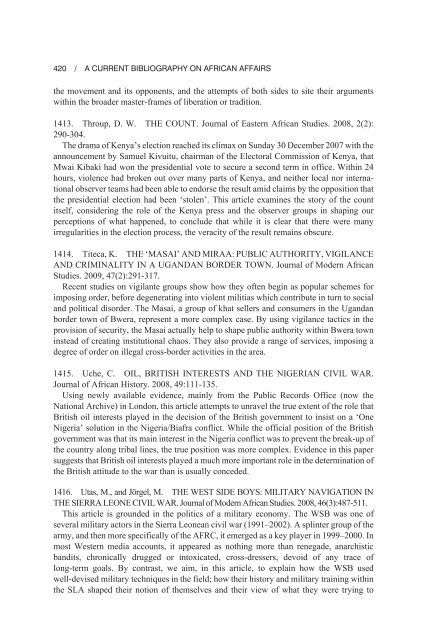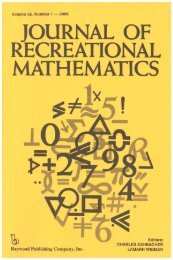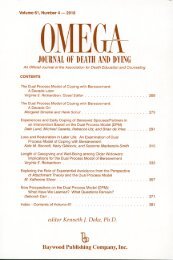A Current Bibliography on African Affairs - Baywood Publishing
A Current Bibliography on African Affairs - Baywood Publishing
A Current Bibliography on African Affairs - Baywood Publishing
You also want an ePaper? Increase the reach of your titles
YUMPU automatically turns print PDFs into web optimized ePapers that Google loves.
420 / A CURRENT BIBLIOGRAPHY ON AFRICAN AFFAIRS<br />
the movement and its opp<strong>on</strong>ents, and the attempts of both sides to site their arguments<br />
within the broader master-frames of liberati<strong>on</strong> or traditi<strong>on</strong>.<br />
1413. Throup, D. W. THE COUNT. Journal of Eastern <strong>African</strong> Studies. 2008, 2(2):<br />
290-304.<br />
The drama of Kenya’s electi<strong>on</strong> reached its climax <strong>on</strong> Sunday 30 December 2007 with the<br />
announcement by Samuel Kivuitu, chairman of the Electoral Commissi<strong>on</strong> of Kenya, that<br />
Mwai Kibaki had w<strong>on</strong> the presidential vote to secure a sec<strong>on</strong>d term in office. Within 24<br />
hours, violence had broken out over many parts of Kenya, and neither local nor internati<strong>on</strong>al<br />
observer teams had been able to endorse the result amid claims by the oppositi<strong>on</strong> that<br />
the presidential electi<strong>on</strong> had been ‘stolen’. This article examines the story of the count<br />
itself, c<strong>on</strong>sidering the role of the Kenya press and the observer groups in shaping our<br />
percepti<strong>on</strong>s of what happened, to c<strong>on</strong>clude that while it is clear that there were many<br />
irregularities in the electi<strong>on</strong> process, the veracity of the result remains obscure.<br />
1414. Titeca, K. THE ‘MASAI’ AND MIRAA: PUBLIC AUTHORITY, VIGILANCE<br />
AND CRIMINALITY IN A UGANDAN BORDER TOWN. Journal of Modern <strong>African</strong><br />
Studies. 2009, 47(2):291-317.<br />
Recent studies <strong>on</strong> vigilante groups show how they often begin as popular schemes for<br />
imposing order, before degenerating into violent militias which c<strong>on</strong>tribute in turn to social<br />
and political disorder. The Masai, a group of khat sellers and c<strong>on</strong>sumers in the Ugandan<br />
border town of Bwera, represent a more complex case. By using vigilance tactics in the<br />
provisi<strong>on</strong> of security, the Masai actually help to shape public authority within Bwera town<br />
instead of creating instituti<strong>on</strong>al chaos. They also provide a range of services, imposing a<br />
degree of order <strong>on</strong> illegal cross-border activities in the area.<br />
1415. Uche, C. OIL, BRITISH INTERESTS AND THE NIGERIAN CIVIL WAR.<br />
Journal of <strong>African</strong> History. 2008, 49:111-135.<br />
Using newly available evidence, mainly from the Public Records Office (now the<br />
Nati<strong>on</strong>al Archive) in L<strong>on</strong>d<strong>on</strong>, this article attempts to unravel the true extent of the role that<br />
British oil interests played in the decisi<strong>on</strong> of the British government to insist <strong>on</strong> a ‘One<br />
Nigeria’ soluti<strong>on</strong> in the Nigeria/Biafra c<strong>on</strong>flict. While the official positi<strong>on</strong> of the British<br />
government was that its main interest in the Nigeria c<strong>on</strong>flict was to prevent the break-up of<br />
the country al<strong>on</strong>g tribal lines, the true positi<strong>on</strong> was more complex. Evidence in this paper<br />
suggests that British oil interests played a much more important role in the determinati<strong>on</strong> of<br />
the British attitude to the war than is usually c<strong>on</strong>ceded.<br />
1416. Utas, M., and Jörgel, M. THE WEST SIDE BOYS: MILITARY NAVIGATION IN<br />
THE SIERRA LEONE CIVIL WAR. Journal of Modern <strong>African</strong> Studies. 2008, 46(3):487-511.<br />
This article is grounded in the politics of a military ec<strong>on</strong>omy. The WSB was <strong>on</strong>e of<br />
several military actors in the Sierra Le<strong>on</strong>ean civil war (1991–2002). A splinter group of the<br />
army, and then more specifically of the AFRC, it emerged as a key player in 1999–2000. In<br />
most Western media accounts, it appeared as nothing more than renegade, anarchistic<br />
bandits, chr<strong>on</strong>ically drugged or intoxicated, cross-dressers, devoid of any trace of<br />
l<strong>on</strong>g-term goals. By c<strong>on</strong>trast, we aim, in this article, to explain how the WSB used<br />
well-devised military techniques in the field; how their history and military training within<br />
the SLA shaped their noti<strong>on</strong> of themselves and their view of what they were trying to




